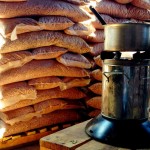African Startup Converts Waste Into Clean Fuel | Source: Zoe Fox, mashable.com – Aug 20, 2013.
KITWE, Zambia — A joint Zambian and Swedish venture is looking to curb deforestation by introducing a new type of cookstove, which runs solely on clean fuel, into Zambian households.
Zambia cuts down hundreds of thousands of wooded acres every year, as one of the most aggressive sites of deforestation in the world. According to a recent report, Zambia loses between 600,000 and 750,000 acres of its 125 million acres of forest each year. 
One of the major drivers of this deforestation is household cooking on charcoal-burning stoves, used in 80% of households. While electric stoves are making headway among the country’s wealthy, unreliable electricity requires nearly every house to have a charcoal-burning backup, which is both unsafe and detrimental to the environment.
Emerging Cooking Solutions‘ bio-waste pellet-burning stove could eliminate the use of charcoal from kitchens — if it catches on.
Using disposed sawdust from pine and eucalyptus trees, Emerging Cooking Solutions manufactures pellets made from from the bustling sawmill industry in Kitwe, located in the country’s lucrative Copperbelt region.
“Sawdust lies untapped and unused, while charcoal has exerted tremendous pressure on the forests,” Sonta Kuati, founder of Emerging Cooking Solutions, tells Mashable.
The bio-waste pellets replace the need for liquified petroleum gas and kerosene burned in the charcoal-burning stoves (as well as the need for charcoal). Users also save money on fuel, trees are spared from further deforestation, women save time collecting firewood, and carbon dioxide emissions and indoor air pollution are reduced.
After a family purchases the company’s signature “SupaMoto” stove — a Lesotho-manufactured, Phillips-brand product named after the local word for fire — they just need to purchase pellets from a handful of convenience stores and gas stations, which sell the Emerging Cooking Solutions pellets. So far, the pellets and stoves are only being sold in Kitwe, though the nascent startup is looking to expand in the coming months. Another startup in Rwanda plans to produce similar bio-waste pellets that can be burnt in the same Phillips stove.
The Phillips stove comes with a rechargeable battery, which can last two weeks before needing a recharge in its provided electric charger.
Since going to market in May, the cookstoves’ rollout has been gradual, selling just 250 to date. By the end of the year, the startup hopes to sell 500 stoves. Thus far, the majority have been sold by partnering with major employers in Kitwe, who roll out employee benefit programs, allowing people to pay for their stoves through two or three deductions taken from their regular pay checks. The Phillips cookstove is also for sale in the same retail outlets that sell the pellets. The company sells the stove for roughly $100, which Kuati admits is too pricy for many Zambians, even though using the stove is cheaper in the long-run.
As Emerging Cooking Solutions scales, Kuati plans to increase output of its single pellet-producing machine, which five workers operate for eight hours a day. By adding two additional eight-hour shifts to each day, the machine’s current output will be tripled. Kuati anticipates it will be challenging to transport the pellets far from Kitwe, due to Zambia’s limited infrastructure, though he’s not worried about creating new distribution outlets.
Another challenge, Kuati says, has been that people are still largely unfamiliar with the concept of micro-gasification, through which the pellets burn in the Phillips stove. Though market research has shown that people are willing to change their cooking habits if a cheaper model emerges, the Phillips product’s price and its newness can make it a tough sell.
“Bio-energy pellet making has been largely nonexistent in Africa,” Kuati says. “We want Zambia to be on the map, and we want to show other countries like Zambia that we can use clean energy.”



